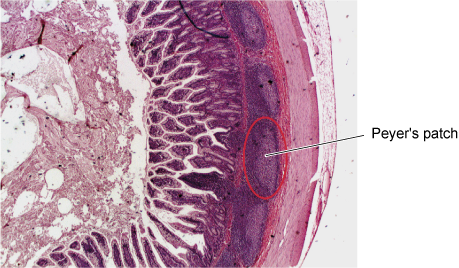2.7 Gut microbiome and the immune response
-
Question 11
From your everyday knowledge, what, in simple terms, is the function of the immune system?
-
The immune system protects the body from invading pathogens or toxins – microorganisms or substances which can cause disease or even death.
The immune system consists of several different types of immune cells, tissues and organs located throughout the body. This includes the lymphatic system, composed of lymphatic vessels that travel throughout the body and lymphatic tissue, such as lymph nodes. Lymph nodes can become enlarged during infection, when they are often referred to as swollen glands.
There are large numbers of lymph nodes in the abdomen surrounding the GI tract. In addition, the majority of immune cells in the body are located in specialised areas of gut-associated lymphatic tissue (GALT) mainly located in the wall of the small intestine (Figure 16). The tonsils, adenoids and appendix are all GALT.
There is a close interaction between the gut microbiota and the GALT cells, and imbalance of the gut microbiota can alter the way in which the immune system is regulated. As you learnt earlier, the gut microbiome is important for maintaining the structural integrity of the gut wall. If this is compromised during dysbiosis, the gut wall can become more permeable to pathogens and toxins consumed in the food. This can trigger an inflammatory immune response by the GALT tissue and other immune cells located throughout the GI tract and has been linked to the development of some autoimmune conditions.
The metabolites from the microbiome can also communicate with the immune cells directly, to trigger a widespread immune response or send signals to the brain via the vagus nerve. Conversely, the immune system and stress can affect the health and diversity of the gut microbiome.

